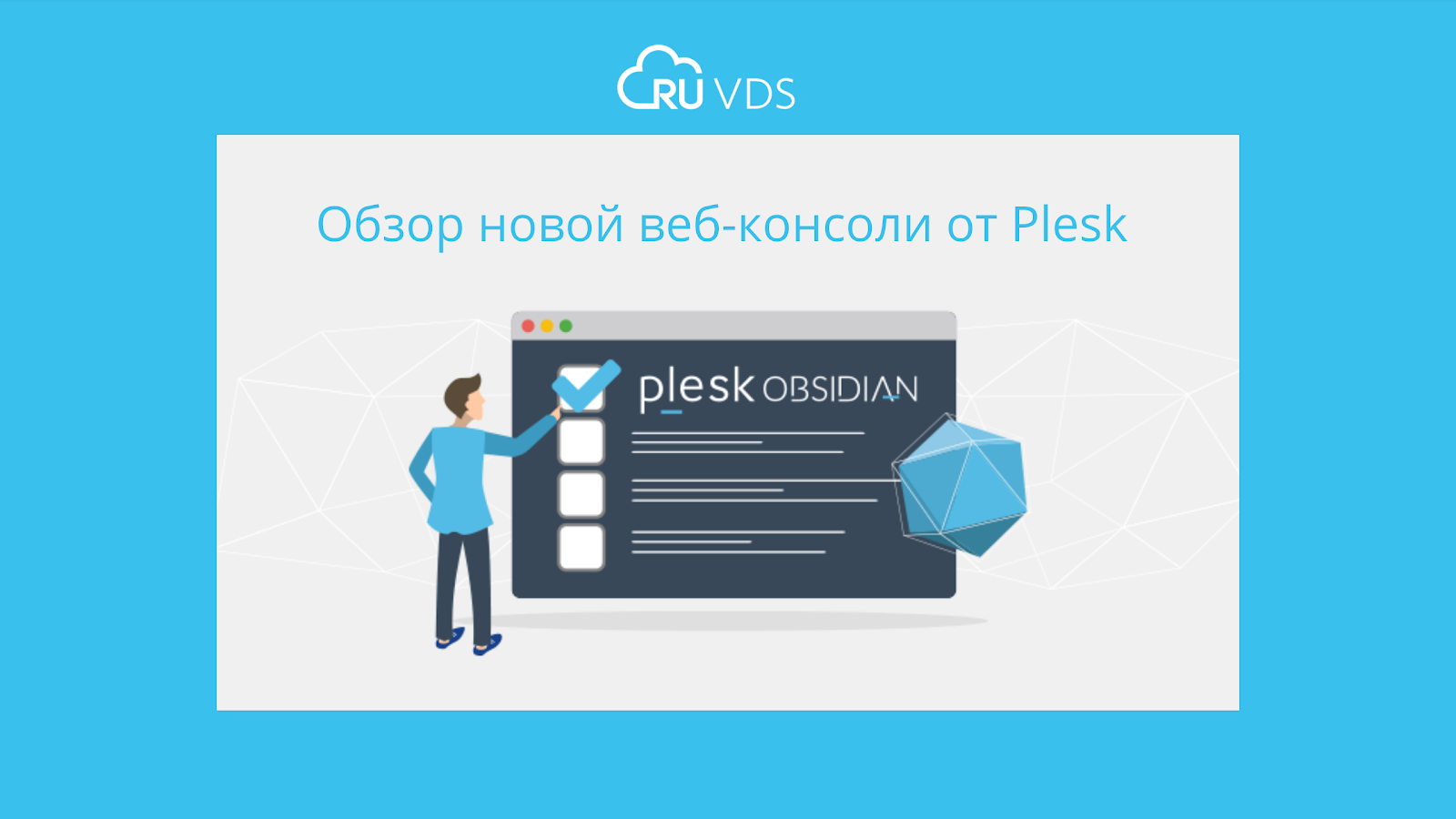
Plesk continues to evolve from a basic functional web console to a powerful management platform, tested on servers, sites, applications, hosting and cloud businesses. Plesk Obsidian enables web professionals, resellers, and service providers to intelligently manage, secure, and run servers, applications, websites, and hosting companies of any size professionally.
Plesk believes that the industry is rapidly changing:
“Digital conversion is no longer just a hallmark, it is a business imperative. We want to not only monitor, understand and anticipate this change, but also to influence it. Digitalizing processes and tasks is changing the way you manage servers, applications and websites in the cloud ... Shared hosting is already a commodity, and bare infrastructure is not good enough to allow your customers to move up the modern web stack. An ever-growing number of customers is willing to pay for additional services such as managed WordPress, managed backups, increased security, increased speed and performance of websites and application hosting, and much more. Simply put, today the biggest challenge for companies of any size is understanding the potential of digital technology, which areas of their business can benefit from digital transformation, and how easily they can be implemented and managed. Clean infrastructure specifications are no longer prioritized ... Therefore, the new Plesk Obsidian dashboard now uses artificial intelligence, machine learning, and automation technologies to empower [administrators and site owners] and help hosting companies around the world efficiently manage digital transformation. ”
And, actually, about the new Plesk Obsidian panel in the framework of digital transformation ( documentation here ).
New key features of Plesk Obsidian
▍Modern web stack for quick application and site development
With Plesk, Obsidian is an optimized out-of-box web stack and a ready-to-code innovative platform with all deployment options and convenient tools for developers (Git, Redis, Memcached, Node.js, etc.).
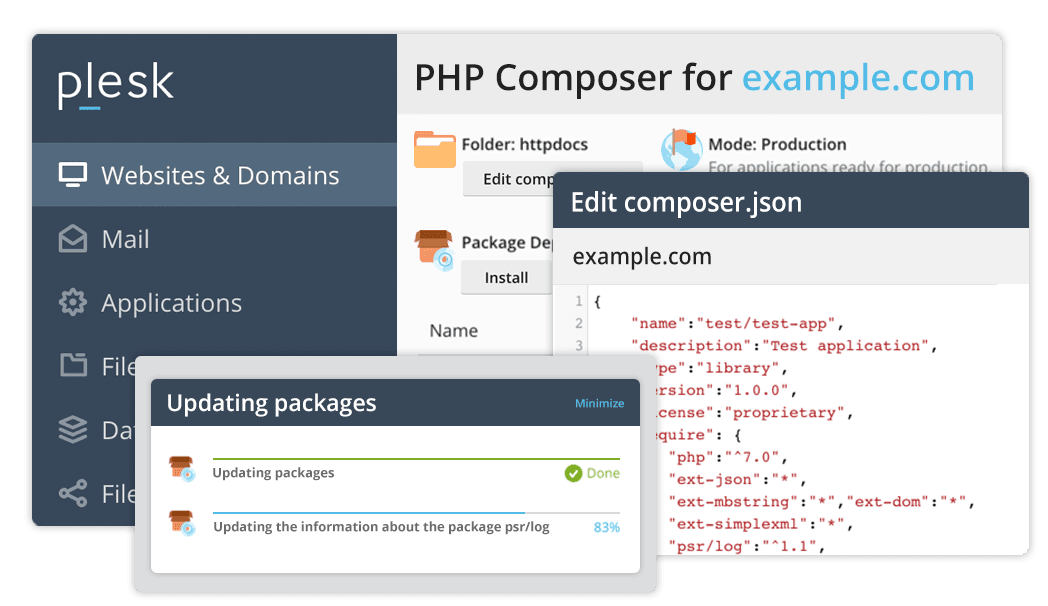
PHP Composer - dependency manager for PHP
One of the many problems that web developers face is related to dependencies. Integrating new packages into a project often brings more hassle than benefits. This is especially true for PHP developers. Quite often, programmers build modules from scratch, and achieving consistency of data between web pages is a pain, which is the greater, the more variables. As a result, good developers spend a lot of time and resources on redundant tasks, and at the same time they want to be productive and quickly release new code. That's why Plesk Obsidian has Composer, an elegant and simple dependency manager for PHP, which makes it easy to manage the dependencies of a PHP project (the extension is installed manually).
Docker NextGen - Docker Convenient Service Delivery Feature
Running applications in containers instead of virtual machines is gaining momentum in the IT world. Technology is considered one of the fastest growing in the recent history of the software industry. It is based on Docker, a platform that allows users to easily package, distribute, and manage applications in containers. With the Docker NextGen function, it has become easier to use turnkey Docker-based solutions (Redis, Memcached, MongoDB, Varnish, etc.) rather than exposing the Docker technology itself, which is convenient. Support services for websites are deployed in one click. Plesk configures the services and then easily automatically integrates them with your website. (Coming Soon).
MongoDB - flexible, versatile and easy to use database
And most in demand, according to Stack Overflow Developer Survey 2018 , the world's largest developer survey with more than 100,000 respondents. Plesk Obsidian configures the MongoDB service. MongoDB instances, like any other database, can be managed locally or remotely. And seamlessly integrate them into the development workflow. (Will be available soon).
Restricted access mode
Limiting server-side operations gives administrators a greater degree of control over what operations Plesk users can and cannot do. The new restricted access mode can be applied both to the panel administrator (service provider) and to site administrators (panel administrator).
→ Details in the documentation
When restricted mode is enabled, you can:
- see what services and resources are available to the administrator in the "Advanced user" mode
- grant administrators the rights of clients to Plesk by controlling their access to potentially risky operations: update management, rebooting, shutting down, etc.
- Find out what tools and parameters are available to the administrator in the “Experienced User” and “Service Provider” modes for server administration and web hosting administration (in the “Administration Tools” and “Hosting Tools” tabs, respectively).
Safer, Useful, and More Reliable Developer Tools
- Several improvements in PHP-FPM and Apache services. Restarting Apache is now reliable enough to set it as the default to minimize site downtime.
- The disk space required to restore individual objects from backups stored in remote storage has been reduced.
- The PHP engines shipped with Plesk Obsidian contain popular PHP extensions (odium, exif, fileinfo, etc.).
- The PageSpeed module is now precompiled with NGINX.
Comprehensive Security Plesk Security Core
Activated by default, first-class server-to-site protection against the most common attacks on websites and against malicious users.
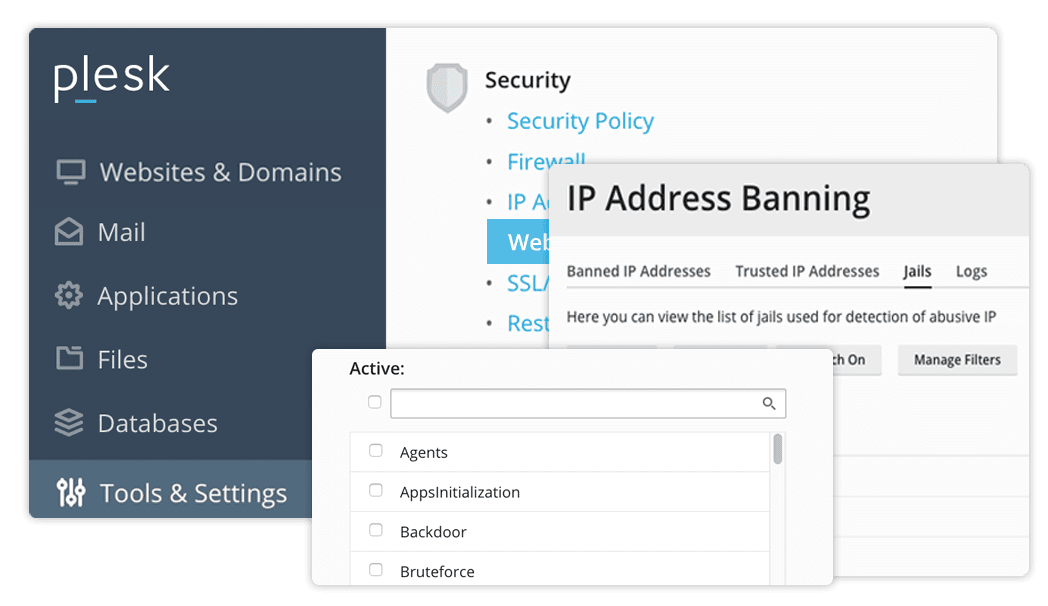
Good default hosting
- Mod_security (WAF) and fail2ban are active out of the box.
- By default, systemd will now automatically restart failed Plesk services after 5 seconds.
- On newly created websites, HTTP> HTTPS optimized for SEO is enabled by default.
- On system-based Linux (CentOS 7, RHEL 7, Ubuntu 16.04 / 18.04, and Debian 8/9), Plesk emergency services now restart automatically.
- The PHP-FPM restriction, often called max_children, is to configure the maximum number of parallel PHP-FPM processes running on the server (there were 5 before).
- SPF, DKIM, and DMARC are now enabled by default for incoming and outgoing emails.
Mail Enhancements
- Mail users now receive email notifications when more than 95% of their mailbox disk space is occupied. More details.
- Mail users can also view information about the mailbox disk space, its use and restrictions in the Horde and Roundcube webmail clients.
- Plesk mail server and webmail are now accessible by default via HTTPS: they are protected by the standard SSL / TLS certificate that Plesk itself protects. More details.
- The Plesk administrator can now change the passwords of customers, resellers, and additional users by automatically sending them an email with a link to reset the password. Mail users and additional users can now specify an external email address that will be used to reset the password if they lose access to the primary email address. More details.
- By default, mail autodiscover is enabled in panel.ini so Plesk can easily support the most popular email, desktop, and mobile email clients. This new feature allows you to automatically configure mail for Exchange Outlook and Thunderbird email clients. More details .
Backup optimization
- Significantly reduced free disk space on the server needed to create and restore backups to the cloud storage (Google Drive, Amazon S3, FTP, Microsoft One Drive, etc.). This saves on storage costs.
- Remote backup operations time is reduced. For example, backups stored in cloud storage can now be deleted four times faster than before.
- To restore one subscription from a full server backup, now you only need additional free disk space equal to the space occupied by this particular subscription, and not a full server backup.
- To backup a server to the cloud storage now requires additional free disk space equal to the space occupied by two subscriptions, and not the entire server.
- Plesk Obsidian comes with Repair Kit, a powerful diagnostic and self-healing tool that allows your customers to fix potential problems anytime, wherever they are, or even when Plesk is unavailable. Fixes problems with: mail server, web server, DNS server, FTP server, Plesk Microsoft SQL Server database or Plesk file system itself - MySQL.
→ More in the documentation
User Experience, UX
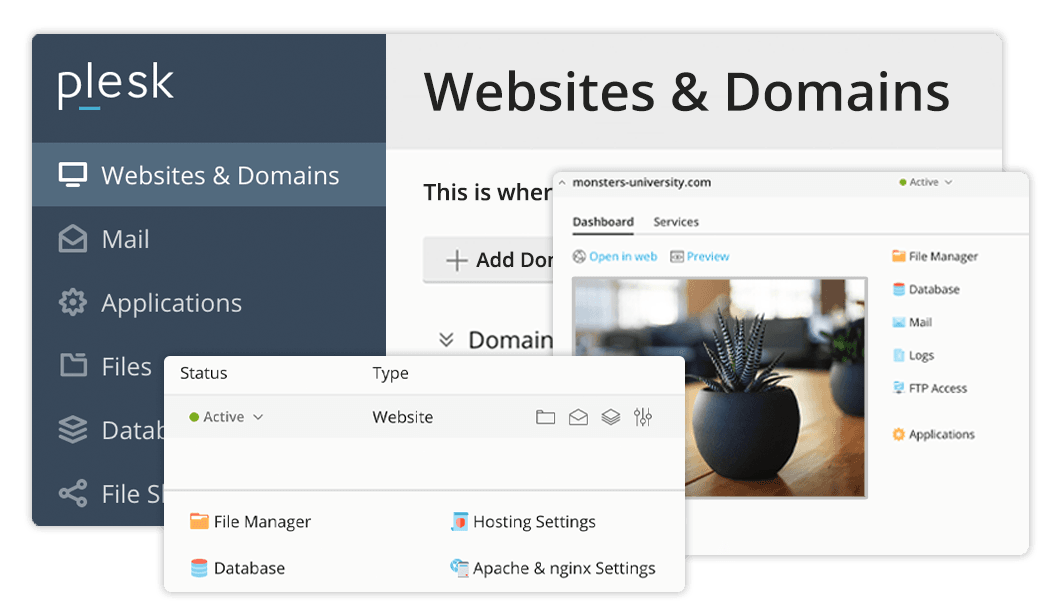
Simplified server and website management
Plesk Obsidian introduces a completely new, streamlined user interface that makes server management even easier. Now your customers can comfortably work with all websites on one screen: browse them in detail, select mass management or work with them one at a time in the form of a list or group using the appropriate functions and controls of the selected CMS.
The interface has become more convenient, easier and more pleasing to the eye. The colors and font sizes are optimized, all elements are aligned on the grid. For greater efficiency, the left menu can be reduced. Global search has become more visible.
Moving domains between subscriptions
Previously, this was a difficult manual task requiring an advanced set of server administrator skills. Plesk Obsidian makes it easy to move a domain to another subscription with its contents, configuration files, log files, PHP settings, APS applications, as well as subdomains and domain aliases (if any). You can do this through the command line.
→ More in the documentation
Notification bar
Important notifications in eye-friendly HTML format are now displayed directly in the Plesk user interface. The function allows you to make sure that critical problems have become known and take steps to solve them without losing valuable time and money from customers. Notifications in the panel (in the future, mobile ones are also planned) are currently generating events such as: “the monitored parameter has reached the“ RED ”level”; “Plesk update available / was installed / failed to install”; "ModSecurity Rule Set Installed." More details .
Improved file manager
File Manager now has bulk upload and file search, which makes it more productive. Read about the previous version in the documentation .
What are other news:
- Download and extract RAR, TAR, TAR.GZ and TGZ archives.
- Search for files by file name (or even part of the name) or content.
Coming soon:
- Quickly view images and text files without opening new file manager screens through the preview panel.
- The file manager will save the requests and prompt them to automatically fill in as you type.
- Accidentally deleted the wrong file or directory through File Manager? Restore it through the File Manager user interface, even if you do not have a backup.
- If you disrupt your website by changing file permissions or the directory structure of files, fix it using the Plesk recovery function through the file manager user interface.
Other panel improvements
Extensions and Applications
The extension catalog is now integrated into the Plesk Obsidian. This technology is needed to quickly and flexibly solve customer problems. Allows you to add additional products and services to your own storefront for customers without much effort. More details .
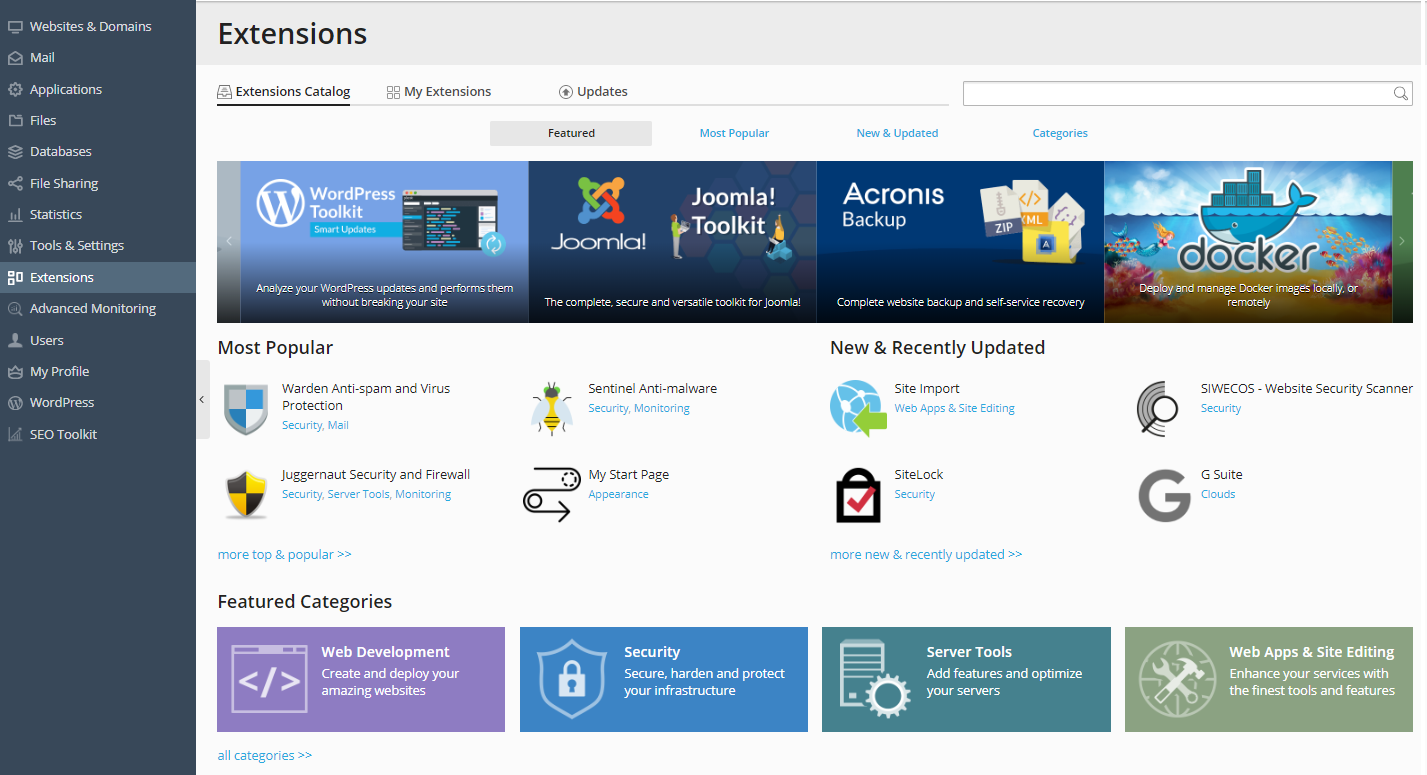
Advanced monitoring
Replaces the existing HealthMonitoring tool with the new Grafana extension . Allows you to monitor the availability of the server and the website and set up alerts to notify their owners about problems related to resource consumption (CPU, RAM, disk I / O) via email or in the Plesk mobile application. More details .
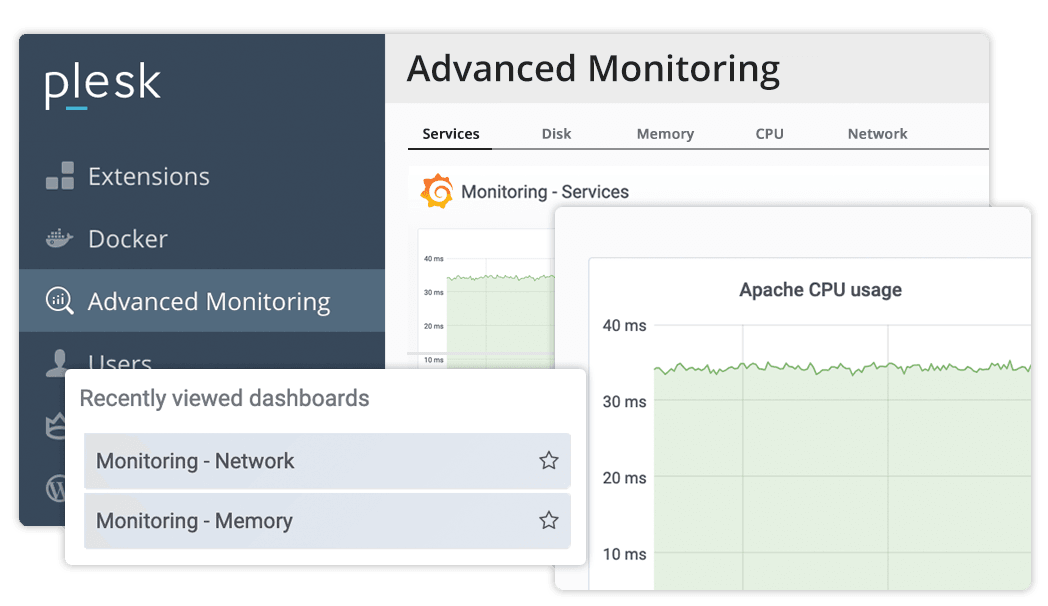
Managed Services
Managed hosting services can range from simply updating the OS and installing a one-click dashboard for WordPress only, to a fully managed infrastructure that includes OS, applications, security, 24x7x365 support (even at the WordPress application level), a suitable backup and recovery strategy, tools performance monitoring, WordPress optimization, SEO improvements and more.
By the way, WordPress is still a content management system that occupies 60% of the global CMS market. Today, WordPress has created about 75 million websites. The lifeblood of any managed WordPress hosting in Plesk remains the WordPress Toolkit . It was created in conjunction with WordPress experts for users of all skill levels. Plesk works closely with the WordPress community and we are constantly updating the WordPress Toolkit based on feedback from community members. The WordPress Toolkit in conjunction with Smart Updates is currently the only comprehensive WordPress management solution available on the market and allows you to innovate again and compete instantly with leading players in the specialized WordPress hosting market.
Conclusion
Since the early 2000s, Plesk has simplified the lives of web professionals, SMEs, and continues to benefit many cloud services. Headquartered in Switzerland, Plesk operates on 400,000 servers worldwide, providing more than 11 million websites and 19 million mailboxes. Plesk Obsidian is available in 32 languages, and many of the leading providers of cloud and hosting services work with Plesk - including us. By the end of the year, all new RUVDS clients can purchase the Plesk Obsidian panel for free when buying a virtual server!

